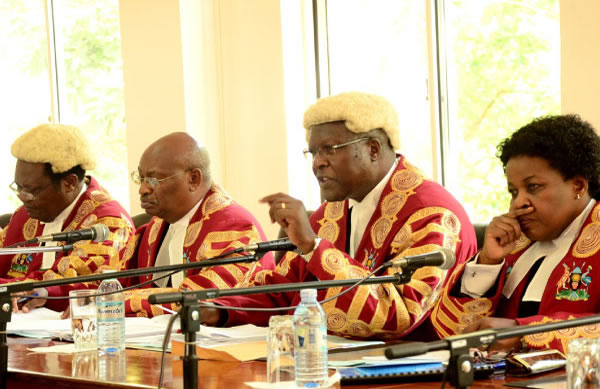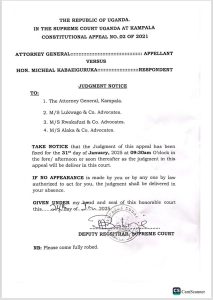
By Our Reporter
NATIONAL
The Supreme Court of Uganda has announced that it will deliver its much-anticipated judgment on the constitutionality of Court Martialing civilians on January 31, 2025.
The case, Attorney General vs. Hon. Michael Kabaziguruka (Constitutional Appeal No. 02 of 2021), has been at the center of intense public and activist scrutiny.
The judgment notice, issued on January 24, 2025, by the Deputy Registrar of the Supreme Court, confirms that the ruling will be delivered at 9:30 AM.

Legal representatives from the Ministry of Justice, Lukwago & Co. Advocates, Rwakafuzi & Co. Advocates, and Alaka & Co. Advocates have been notified to appear fully robed for the session.
The ruling comes after years of delays and mounting pressure from human rights defenders, lawyers, and activists who have criticized the prolonged detention of civilians subjected to military trials.
The case was filed in 2021 by Hon. Michael Kabaziguruka, a former Member of Parliament and opposition figure, challenging the constitutionality of trying civilians in military courts.
Kabaziguruka himself had faced charges in the military tribunal, sparking a national debate on the fairness and legality of such trials.
In recent weeks, activists have intensified their calls for the Supreme Court to resolve this contentious issue.
Protests led by human rights lawyer Agather Atuhaire and the recent arrest and sentencing of fellow lawyer Eron Kiiza have brought renewed attention to the issue.
Kiiza, who was sentenced to nine months in prison by the court martial for alleged contempt of court, was representing clients in cases involving military tribunals.
His treatment has been condemned by legal and human rights groups as emblematic of the injustices inherent in trying civilians in military courts.
Atuhaire, who was arrested while protesting outside the Supreme Court, highlighted the impact of the delay on detainees. “The Chief Justice has sat on cases that are affecting people’s lives. Citizens have been in jail for years without justice,” she said.
Constitutional Implications
The case raises critical questions about the separation of powers, judicial independence, and adherence to international human rights standards. Legal experts argue that trying civilians in military courts violates the constitutional principle of a fair trial and Uganda’s obligations under international law.
“This is not just a legal issue; it’s a matter of human rights, justice, and the rule of law,” said lawyer Phillip Karugaba in a statement earlier this week.
He emphasized that the military court system, designed for the armed forces, lacks the safeguards necessary to ensure impartiality and fairness for civilians.
However, President Museveni insists that military courts have played a key role in the stabilization of Uganda by enforcing discipline in the army and dealing with security-related cases.
What’s at Stake?
The ruling on January 31 could have far-reaching implications for Uganda’s legal landscape. If the court finds that military tribunals lack jurisdiction over civilians, it could invalidate ongoing and past cases against civilians in military courts, potentially leading to retrials or dismissals.
Conversely, upholding the practice could spark further criticism and protests from civil society groups


